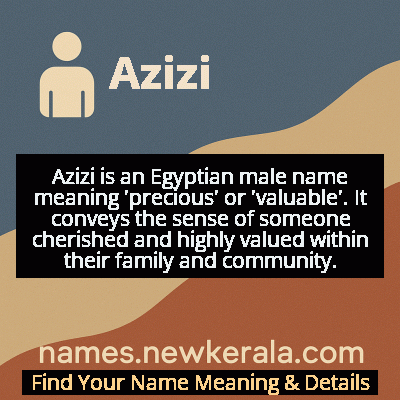Azizi Name Meaning & Details
Origin, Popularity, Numerology Analysis & Name Meaning of Azizi
Discover the origin, meaning, and cultural significance of the name AZIZI. Delve into its historical roots and explore the lasting impact it has had on communities and traditions.
Name
Azizi
Gender
Male
Origin
Egyptian
Lucky Number
8
Meaning of the Name - Azizi
Azizi is an Egyptian male name meaning 'precious' or 'valuable'. It conveys the sense of someone cherished and highly valued within their family and community.
Azizi - Complete Numerology Analysis
Your Numerology Number
Based on Pythagorean Numerology System
Ruling Planet
Saturn
Positive Nature
Ambitious, efficient, realistic, and authoritative.
Negative Traits
Materialistic, stressed, confrontational, and can be overly ambitious.
Lucky Colours
Dark blue, black.
Lucky Days
Saturday.
Lucky Stones
Blue sapphire, amethyst.
Harmony Numbers
2, 4, 6.
Best Suited Professions
Business leaders, managers, financial services, law enforcement.
What People Like About You
Leadership, determination, organizational skills.
Famous People Named Azizi
Azizi Gibson
Rapper and musician
Indonesian-American rapper known for his unique blend of hip-hop and electronic music
Azizi Johari
Politician
Malaysian politician who served as Deputy Minister of Youth and Sports
Azizi Mirshahi
Academic researcher
Iranian medical researcher known for contributions to hematology and blood disorders
Azizi Fatah
Businessman
Tanzanian entrepreneur and founder of multiple successful businesses in East Africa
Name Variations & International Equivalents
Click on blue names to explore their detailed meanings. Gray names with will be available soon.
Cultural & Historical Significance
The name embodies traditional values of strength, honor, and cherished status within family and community structures, making it a popular choice for generations in Egypt and throughout the Middle East. In modern Egyptian society, Azizi continues to represent these enduring values while adapting to contemporary contexts. The name's cultural resonance extends beyond religious significance to encompass broader social values of respect, reliability, and the precious nature of human relationships that form the foundation of Egyptian social fabric.
Extended Personality Analysis
Individuals named Azizi are often perceived as possessing a natural dignity and inner strength that commands respect. They typically exhibit leadership qualities combined with a protective nature toward those they care about, reflecting the name's meaning of being precious and valuable. Azizis are known for their loyalty and reliability, often serving as pillars of support within their families and social circles. Their personality blends traditional values with modern adaptability, allowing them to navigate various social situations with grace and confidence.
Many Azizis demonstrate a strong sense of responsibility and take pride in their ability to provide stability and guidance to others. They tend to be determined individuals who approach challenges with resilience and a quiet confidence that inspires trust in those around them. While they can be reserved in expressing emotions, their actions consistently demonstrate deep care and commitment to their relationships and principles. This combination of strength and sensitivity makes Azizis particularly effective in roles requiring both authority and compassion, and they often become respected figures in their professional and personal communities through their consistent demonstration of integrity and reliability.
Modern Usage & Popularity
In contemporary times, Azizi maintains steady popularity in Arabic-speaking countries, particularly in Egypt, while also gaining recognition in Western countries through globalization and cultural exchange. The name has seen increased usage among Muslim communities worldwide, appreciated for its strong cultural roots and positive meaning. While not among the most common names in Western countries, it appears with growing frequency in multicultural urban centers. Modern parents often choose Azizi for its blend of traditional significance and contemporary appeal, with the 'precious' meaning resonating across cultural boundaries. The name's usage reflects a balance between honoring heritage and embracing global citizenship, making it particularly popular among families seeking names that maintain cultural identity while being accessible in international contexts.
Symbolic & Spiritual Meanings
Symbolically, Azizi represents much more than its literal translation of 'precious'. It embodies concepts of intrinsic value, enduring strength, and cherished status within relationships and communities. The name carries connotations of rarity and uniqueness, suggesting someone who is irreplaceable and holds special significance to those around them. In metaphorical terms, Azizi symbolizes the idea that true value comes from character and integrity rather than external achievements. It represents the precious bonds of family and friendship, the strength found in dignity and self-respect, and the lasting impact of genuine connections. The name also suggests resilience – the ability to maintain one's value and integrity through life's challenges, much like precious metals that withstand the test of time while retaining their essential qualities and worth.

